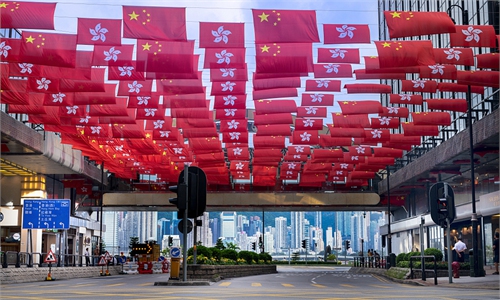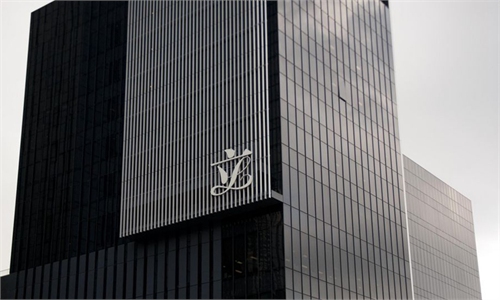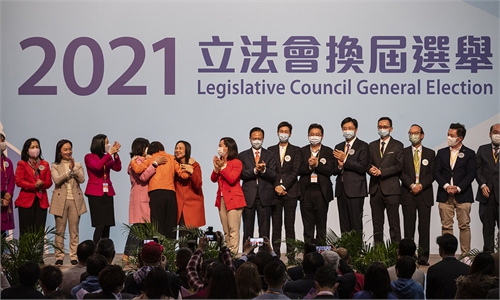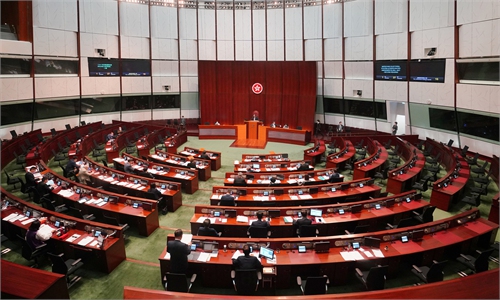Xi praises new electoral system, highlights HK democratic path
New governance team to meet higher expectations: expert
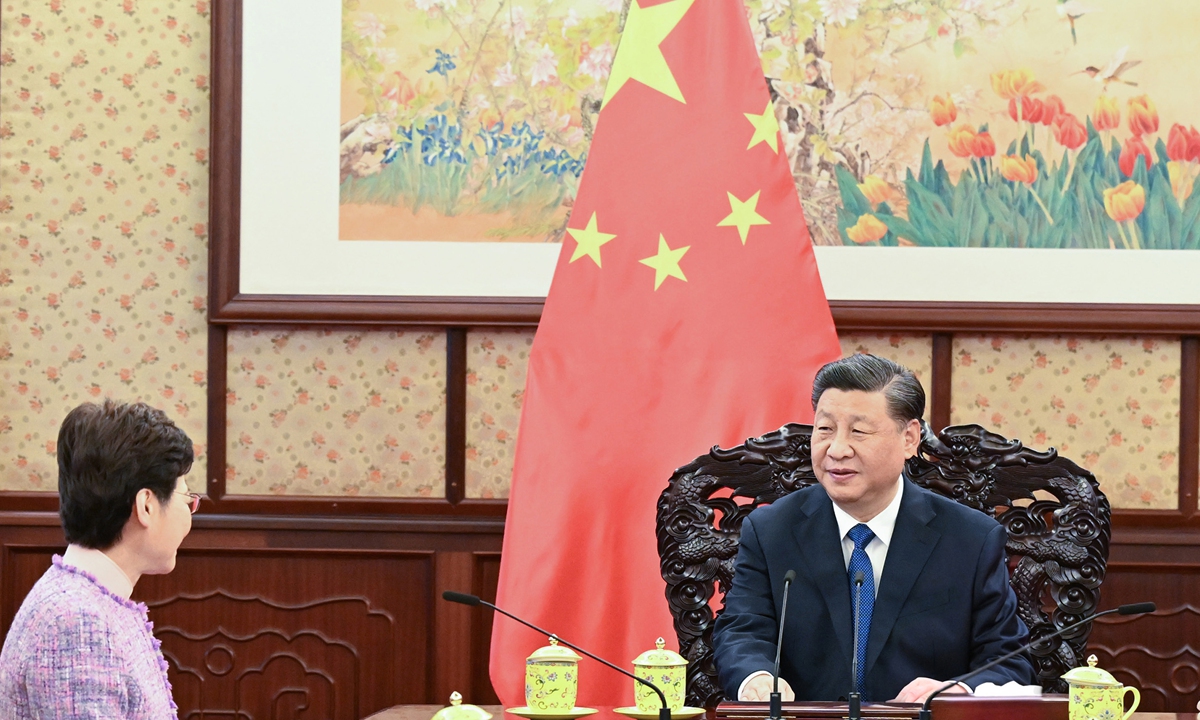
President Xi Jinping meets with Hong Kong Special Administrative Region Chief Executive Carrie Lam in Beijing on December 22, 2021. Lam went to Beijing for her duty report. Photo: Xinhua
Chinese President Xi Jinping met Carrie Lam, chief executive of the Hong Kong Special Administrative Region, in Beijing on Wednesday for her annual duty report trip, two days after the Legislative Council (LegCo) election successfully concluded, which ushered in a new era for local governance.As the city underwent a transition from chaos to stability, the central government brought up new requirements for local governance team, expecting them to accelerate the integration of the Chinese city into the national development plan after the era when Hong Kong was used as a bridgehead by the US-led West to incite a color revolution against China ended.
Over the past year, Hong Kong has consolidated the achievements in restoring order and the situation has constantly improved, Xi said, adding that the region has achieved notable results in COVID-19 response, steadily recovered its economy and maintained social stability.
Lam has led the HKSAR government in making systematic changes and improvements to Hong Kong's electoral system in accordance with relevant decision of the National People's Congress (NPC) and relevant legislation of the NPC Standing Committee, Xi said.
Xi said the elections of the Election Committee and the seventh LegCo held under the new electoral system were both successful, with democratic rights of Hong Kong residents reflected, the principle of "patriots administering Hong Kong" implemented, and a political landscape established with wide and balanced participation from all social groups and constituencies.
It was the first annual duty report delivered by Lam in person to Xi since the end of 2019 as the COVID-19 outbreak in 2020 caused unprecedented challenges to the city, and Xi heard Lam's 2020 duty report in January by video link. Xi also stressed in the meeting in January that the HKSAR must be governed by patriots.
Eleven months later, Lam delivered her duty report to the President in person, and she also came up with "a quite satisfying performance review" in implementing the principle of only-patriot governance, some experts and officials said, noting Hong Kong has entered a new era after the national security law for Hong Kong was enacted and electoral reform adopted.
With those two legislations plugging the system and governance loopholes, future new teams of administrative and legislative governance are expected to meet higher expectations from the central government for achieving social and economic reform by actively addressing the public concerns and fixing deeply-rooted problems such as the housing shortage, lack of opportunities for youth, and widening wealth gap.
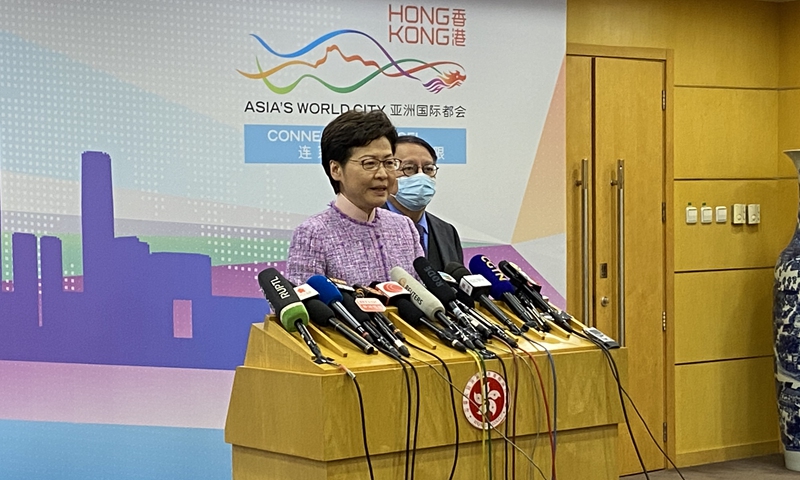
Photo:Global Times
New era
Xi emphasized in the meeting with Lam that Hong Kong has gone through an unusual path over the past more than 20 years, which fully demonstrated that the "one country, two systems" principle helps safeguard the fundamental interests of the country, of the city and of Hong Kong people. The central government will continue unswervingly to carry forward this policy, and with the system's improvement, the "one country, two systems" will further play out its advantages.
As the national security law for Hong Kong effectively prevents the city from being used as a place to instigate secessionism and incite chaos, the electoral reform, which ensures those who govern the city are patriots, is turning the LegCo into a place to push for effective policies from a platform for radical anti-China lawmakers to challenge the sovereignty or create trouble for their own political gain.
And Lam's work to fully implement the national security law for Hong Kong and the electoral reform was highly recognized by Xi during the meeting.
Xi praised her work because the full implementation of these two legislations significantly improved Hong Kong's democratic order. From a system perspective, those changes largely help smooth relations between administrative and legislative authorities and form consensus regarding Hong Kong's further integration into the national development plan, Tian Feilong, an associate professor at Beihang University's law faculty, told the Global Times on Wednesday.
"In response to the requirement mentioned by Xi in January, Lam did a good job," Tian said, noting that those changes also laid out the political fundamentals for the city's overall social and economic restructuring and development.
As Hong Kong's political and social environment entered into a new stage characterized as rational, secure and fair, it's time for lawmakers and government officials to work on concrete issues to gain more public understanding and support for the new electoral system, some experts and officials said. And the future chief executive and LegCo lawmakers are required to be not only patriotic but also capable of advancing some challenging reforms to fix deeply-seated problems.
Before the meeting with Xi, Premier Li Keqiang met with Lam, expressing the central government's unswerving support for the city's future development, expecting that Hong Kong will integrate into the national development plan to provide a larger room for its growth as an international financial hub, trade hub and shipping hub.
New requirements
Though there has been speculation about whether Lam, who was praised by the central government for her work of leading Hong Kong society out of the political dilemma and social turmoil, will run again, she told reporters at a press conference on Wednesday that her only purpose to Beijing this time "is to deliver the annual duty report."
"I don't have any other schedule or plans for my future," she said.
"I think the next chief executive will be the person who will face up to the challenges and be willing to tackle some deeply-rooted problems that had not been solved over the past years--for example, to improve housing conditions. And it would also be the person who will confront the US-led West's interference, as some Western countries would not probably stop containing China in the next 10 years," former LegCo president Rita Fan Hsu Lai-tai, who is also a member of the Candidate Eligibility Review Committee, told the Global Times on Wednesday.
It's important to note that many opportunities lie ahead of us. The new team should put their own personal gains and losses behind them, and dedicate themselves to serving the Hong Kong people, Fan noted.
While the pro-establishment camp is now in a dominant position in the LegCo as 89 out of 90 lawmakers are from the camp, there are also higher requirements for their capability of governing and advising, some experts said.
In the past, the pro-establishment camp's first priority was to prevent the authority of governance from being grabbed by radical rioters and anti-China lawmakers in order to fend off the color revolution, Tian said, noting that as the national security law for Hong Kong and electoral reform fixed those problems, the camp is facing the new task with higher requirements.
"It will also be a test of their capabilities of serving the city and the country, which will be further supervised by the central government," he said.

